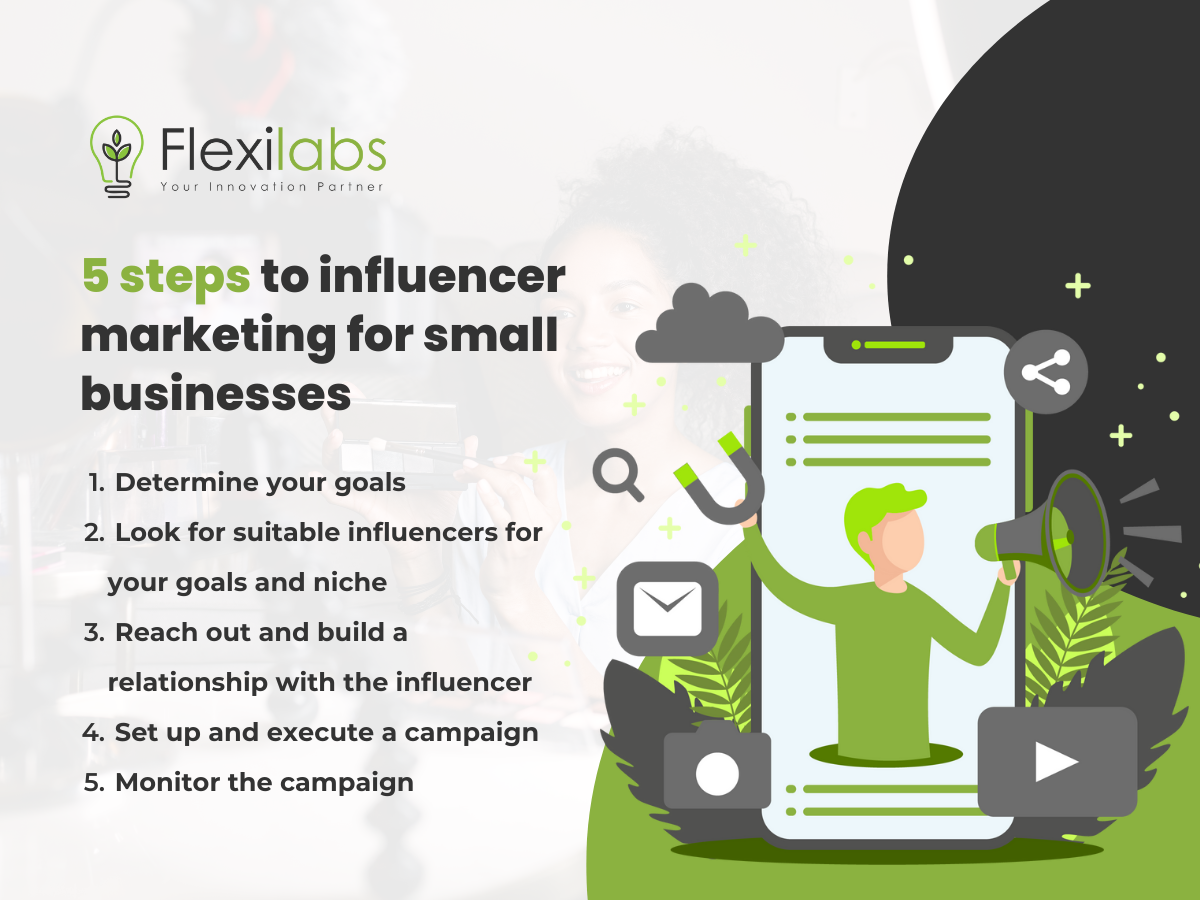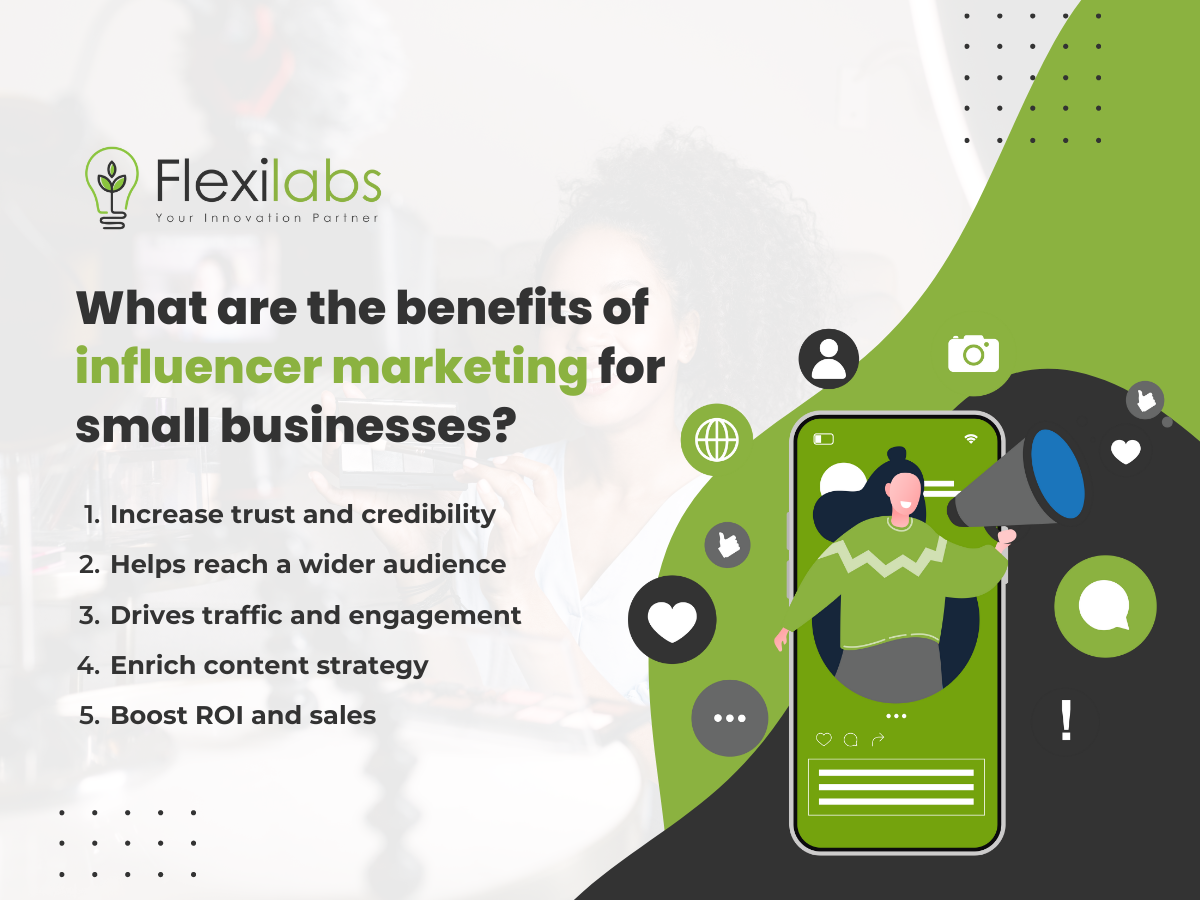In today’s digital age, influencer marketing has become a powerful tool for businesses to connect with their target audience and increase brand awareness. By partnering with influencers – individuals with a significant following and influence on social media platforms – small businesses can tap into their existing audiences and gain exposure to new potential customers.
However, the world of influencer marketing can be complex, with many factors, such as finding the right influencer, setting goals and objectives, and measuring success. This article aims to give small business owners a comprehensive overview of influencer marketing, including the benefits and strategies.
So, whether you’re new to influencer marketing or looking to improve your current efforts, this guide will help you leverage the power of influencer marketing for your small business.
What is Influencer Marketing?
Influencer marketing has become a prevalent form of marketing in recent years. It is a strategy that involves leveraging the influence of influencers to promote products and services. This marketing type can reach a broad audience, build brand awareness, and increase sales.
Likewise, influencer marketing involves working with influencers with an established following on social media platforms such as Instagram, YouTube, and Twitter. These influencers can help brands reach potential customers through content and engagement with followers. They can also provide valuable insights into target audiences and what resonates with them most.
By partnering with the right influencers, businesses can create meaningful connections with their target audiences and grow their commerce.
What are the benefits of influencer marketing for small businesses?
Influencer marketing for small businesses can provide various benefits. It can help them build a strong brand presence, increase customer loyalty, and create a positive public image. By leveraging the power of influential personalities, small businesses can gain access to an engaged audience and drive more sales.
Likewise, here are some of the advantages of using influencer marketing for small businesses and startups.

1. Increase trust and credibility
Credibility is an essential element for any small business to succeed. It allows companies to stand out from the competition and build customer trust, which leads to ROI. Small businesses have difficulty convincing potential customers of their value and reliability without credibility.
Influencer marketing for small businesses is a powerful way to build credibility and trust. It involves leveraging the influence of well-known personalities in your industry to create content that resonates with your target audience. By engaging influencers, you can reach a wider audience, make more meaningful connections, and establish trust with potential customers.
This can help you increase brand awareness and generate more leads. Influencer marketing for small businesses can also build relationships with existing customers and drive loyalty.
2. Helps reach a wider audience
Influencer marketing effectively connects businesses with potential customers and increases brand awareness. It can be used to promote products and services engagingly and cost-effectively.
By leveraging the power of influencers, small businesses can tap into their audiences, build relationships, reach a larger audience, create more leads, and increase sales.
3. Drives traffic and engagement
Influencer marketing drives traffic and engagement to your website or social media channels. Influencers have a vast network of stakeholders and audiences. Businesses can leverage this and reach new audiences, invite traffic, and boost conversions.
Additionally, influencer marketing can help build long-term relationships with key stakeholders in the industry, leading to more future collaboration opportunities.
4. Enrich content strategy
Influencer marketing for small businesses is also great for creating great content strategies. How so? Well, influencers are experienced and are experts in creating niche content that stands out from the competition. Collaborating with influencers can bring fresh perspectives and ideas to a brand’s content strategy.
Influencers can provide unique insights and create content that resonates with their audiences, which can help a brand diversify its content and reach new audiences.
5. Increase ROI and sales
Another reason to use influencer marketing for small businesses is that it can increase sales and ROI. Influencers have the power to create content that resonates with their followers, which can result in increased sales and ROI for businesses.
With influencer marketing, businesses can target specific audiences interested in their products or services, allowing them to capitalize on the influence of influencers and reach more potential customers. Additionally, influencer marketing can help businesses build trust with their target audience by creating authentic relationships with influencers who share similar values and interests.
6 Tips to influencer marketing for small businesses.
Now that you know how influencer marketing can help businesses, it’s time to learn how to connect with influencers. Here are six tips for small businesses to get started with influencer marketing.

1. Determine your goals
Before diving into influencer marketing, defining what you want to achieve is essential. Influencer marketing goals can vary from increasing brand awareness, driving engagement, generating leads and sales, or building relationships with customers.
Having clear goals will help you determine the right influencers to partner with and measure the success of your campaigns.
2. Look for relevant influencers to your goals and niche
Finding relevant influencers for your objectives and niche can be a challenge. Still, ensuring that you are targeting the right people and getting the most out of your campaign is essential.
Many influencers out there can help any size of business. For small businesses, however, you need to shrink your scope into something close to your niche and goals. Look for influencers who align with your values and target audience. You can use tools like BuzzSumo or influencer databases to find relevant influencers in your niche. Also, consider micro-influencers who have smaller followings but a highly engaged audience.
With careful deliberation of audience size, engagement rate, and content quality, you can find the perfect influencer to help your business reach its goals.
3. Reach out and build a relationship with the influencer
Once you’ve identified potential influencers, start building relationships with them. Building relationships with influencers is essential to your influencer marketing campaign. Not only will it be the foundation of your partnership, but also it could be an effective way to earn their audience’s trust.
To start, business owners must research the influencers, understand their interests and what kind of content they create, and then use this information to craft a personalized approach when reaching out. Then, engage with their content, comment on their posts, and share their content. This will help establish a rapport with them and increase the probability of a successful collaboration. Likewise, you show genuine interest in what they do and be willing to provide value in return for their help.
By taking these steps, you can build strong relationships with influencers to help you achieve your goals.
4. Set up and execute a campaign
After connecting with the influencer, it’s time to set up and execute a campaign. To ensure success in influencer marketing campaigns, businesses should set clear objectives that align with their overall marketing goals and strategies. Clearly communicate your expectations with influencers regarding deliverables, timelines, and compensation. This will help avoid misunderstandings and ensure a successful collaboration.
Here are a few primary objectives that should be considered: increasing brand visibility, driving website traffic, boosting engagement on social media platforms, improving customer loyalty, and generating leads.
This will help them measure the success of their campaigns and make necessary adjustments as needed.
5. Monitor the campaign
Don’t forget to measure the success of your influencer marketing for small business campaigns. Track metrics like engagement, reach, and conversions. This will help you determine what worked well and needs improvement for future campaigns.
Leverage Your Small Business with Influencer Marketing!
Overall, incorporating influencer marketing for small businesses can help a brand create more engaging and compelling content, reach new audiences, and build credibility and trust. By following these tips, small businesses can leverage influencer marketing to reach new audiences, build brand awareness, and drive sales.
Want to team up with influencers? Let Flexilabs help you! Our startup program comes with a diverse set of networks. Join us today!

